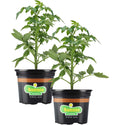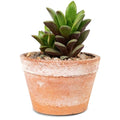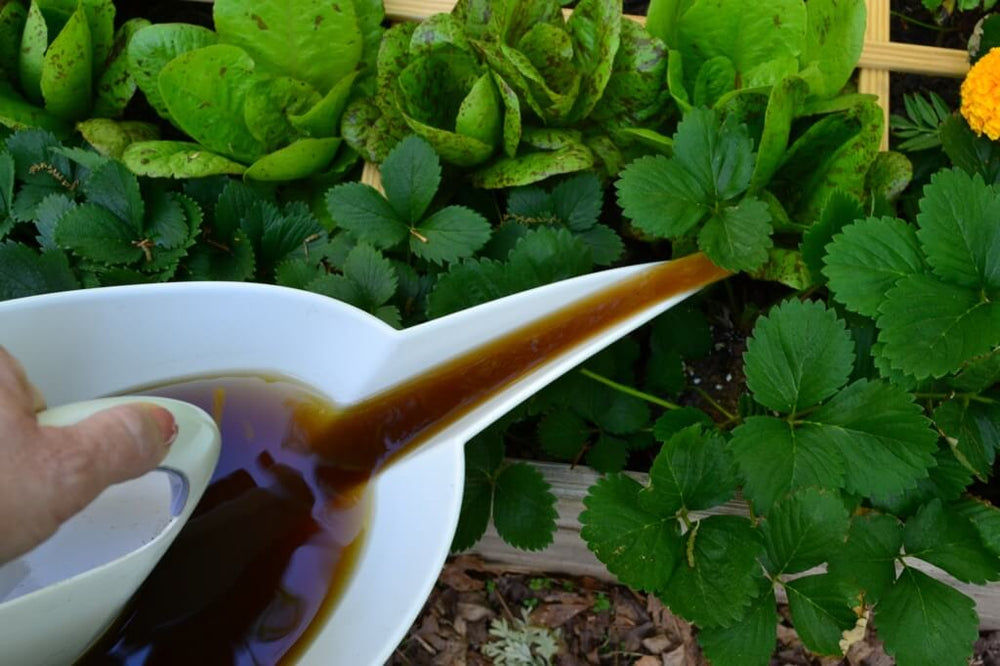Compost—the rich, dark result of decomposed veggie scraps, shredded leaves, and grass clippings—is known as "black gold" among gardeners. That's because composting improves soil in many ways, breaking up heavy clay and helping sandy soils retain water and nutrients. It also contains beneficial microscopic organisms that help make nutrients available to plants. In short, composting helps create great soil, which is key to beautiful, healthy plants and huge harvests. The most effective way to deliver the benefits of compost to your plants is to whip up some compost tea.
What Is Compost Tea?
Compost tea is a liquid created from soaking a small amount of compost in water, adding a food source to feed the hungry microorganisms, and adding air to the solution to give the microbes the conditions they need to reproduce. Once the mix is done brewing (usually in about 24 to 48 hours), you have a nutritionally rich, liquid soil supplement that encourages healthy plant growth.
A few things to note: First, the compost used in compost tea needs to be completely organic, as any fertilizers or pesticides will kill microorganisms. The compost also must be "finished"—in other words, broken down into small particles—to ensure that beneficial microorganisms are present. You'll know it's ready to use when it smells sweet and earthy, not sour and unpleasant. (Need a refresher on making compost? Check out our How to Create a Compost Pile article.)
Why Is Compost Tea Even Better Than Compost?
Adding compost to garden beds is terrific, but feeding plants with compost tea adds even more benefits. When high quality compost is aerated in a solution with molasses, which feeds the microorganisms, the microbial population explodes. Once all these good microbes are added to your garden, they'll begin to devour large numbers of the bad ones, reducing the risk of disease for your plants. Plus, while compost should only be added around plant roots, compost tea can be sprayed on the foliage as well as added to the soil.
Recipe for Compost Tea
This compost tea recipe is relatively easy to make. It will need to sit for a day or two.


Ingredients
- 5 gallon bucket (make sure it's clean, but don't use bleach, which will kill microbes)
- Finished compost, about a gallon
- Shovel
- Water-permeable bag, like an old pillowcase or fine mesh bag
- Twine
- Organic, unsulfured molasses, approximately 1 cup
- De-chlorinated water (either rain water, well water, or tap water that's been standing for 24 hours to allow chlorine to evaporate)
- Aquarium pump and tubing (available from any pet supply store or Amazon.com for about $10)
- Electrical outlet
- Watering can or pump sprayer
Ingredients
- Remove any worms or insects from the compost.
- Place the compost into the water-permeable bag, using a piece of twine to tie the bag closed. Consider this your oversized "tea" bag.
- Fill the bucket with de-chlorinated water, leaving an inch or two of space at the top.
- Add unsulfured molasses to the bucket, stirring well.
- Put the bucket near an outdoor electrical outlet. Place the aquarium tubing in the bucket, and plug in the pump. This will aerate the compost tea, providing the oxygen the microorganisms need to reproduce.
- "Brew" the tea by letting the pump run for 24 to 48 hours. Don't over-brew or allow the tea to stand unaerated, as it can become toxic without an oxygen supply.
- When the tea is done brewing, unplug the pump, remove the tubing, and take out the bag of compost. (You can add the solid compost matter from the bag to a garden bed.)
- Pour the tea into a watering can or pump sprayer and apply both around the base of your plants and directly to the leaves.
If you don't have your own compost pile, you can buy bagged organic compost, such as Nature's Care® Really Good Compost™, to brew your tea. You can even find pre-packaged compost tea bags. You'll still need to use a pump to add oxygen to the brewing water, though.
Now that you're a compost tea expert, keep up the good work. Every couple of weeks, brew another "pot" of compost tea to encourage your garden to continue to produce a big, beautiful harvest!
Article and images by Julie Thompson-Adolf.




 Herbs
Herbs
 Vegetables
Vegetables
 Fruit
Fruit
 Flowers
Flowers
 Succulents
Succulents


